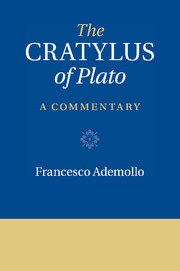Book contents
- Frontmatter
- Contents
- Preface
- Preliminary note
- List of abbreviations
- Introduction
- 1 Cratylus' naturalism (383a–384c)
- 2 Hermogenes' conventionalism (384c–386e)
- 3 Naturalism defended (386e–390e)
- 4 Naturalism unfolded (390e–394e)
- 5 Naturalism illustrated: the etymologies of ‘secondary’ names (394e–421c)
- 6 Naturalism illustrated: the primary names (421c–427e)
- 7 Naturalism discussed (427e–433b)
- 8 Naturalism refuted and conventionalism defended (433b–439b)
- 9 Flux and forms (439b–440e)
- Appendix 1 The text of 437d10–438b8
- Appendix 2 Some interpolations and non-mechanical errors in W and δ
- References
- I General index
- II Index of ancient texts
- III Index of Greek expressions
- IV Index of words discussed in the Cratylus
5 - Naturalism illustrated: the etymologies of ‘secondary’ names (394e–421c)
Published online by Cambridge University Press: 25 October 2011
- Frontmatter
- Contents
- Preface
- Preliminary note
- List of abbreviations
- Introduction
- 1 Cratylus' naturalism (383a–384c)
- 2 Hermogenes' conventionalism (384c–386e)
- 3 Naturalism defended (386e–390e)
- 4 Naturalism unfolded (390e–394e)
- 5 Naturalism illustrated: the etymologies of ‘secondary’ names (394e–421c)
- 6 Naturalism illustrated: the primary names (421c–427e)
- 7 Naturalism discussed (427e–433b)
- 8 Naturalism refuted and conventionalism defended (433b–439b)
- 9 Flux and forms (439b–440e)
- Appendix 1 The text of 437d10–438b8
- Appendix 2 Some interpolations and non-mechanical errors in W and δ
- References
- I General index
- II Index of ancient texts
- III Index of Greek expressions
- IV Index of words discussed in the Cratylus
Summary
With Socrates' analysis of the names in the Atreidae genealogy, from Orestes up to Uranus (394e–396c), the etymologies have begun. The very long section of the dialogue which is devoted to them extends as far as 427d (thus covering 46 pages out of 85 occupied by the whole OCT Cratylus) and contains analyses of a great many words, interspersed with moments of theoretical reflection.
As I have already anticipated time and again, in Cra. we meet two different kinds of etymology. At a first stage Socrates' analyses follow the pattern established by his discussion of Ἕκτωρ, Ἀστυάναξ etc. in 393a–394e, and already hinted at by his interpretation of Cratylus' 383b claim about Hermogenes' name. According to this pattern – the standard one in Greek etymology before and after Plato – names are more or less disguised descriptions of their referents, deriving either from one single word (Ἕκτωρ, Ἄγις) or from more words conflated together in what is actually a compound name (Ἀστυ-άναξ, Ἀρχέ-πολις etc.). Owing to the lapse of time, of course, most names do not bear their etymology on their face any more: some letters must be added or subtracted to recover the original form.
At a second stage (421c ff.) Socrates will face the problem of accounting for those names that cannot be analysed further into other more elementary names. This will call for a different kind of etymologies, based rather on the mimetic power of the letters/sounds that constitute a name.
- Type
- Chapter
- Information
- The Cratylus of PlatoA Commentary, pp. 181 - 256Publisher: Cambridge University PressPrint publication year: 2011



